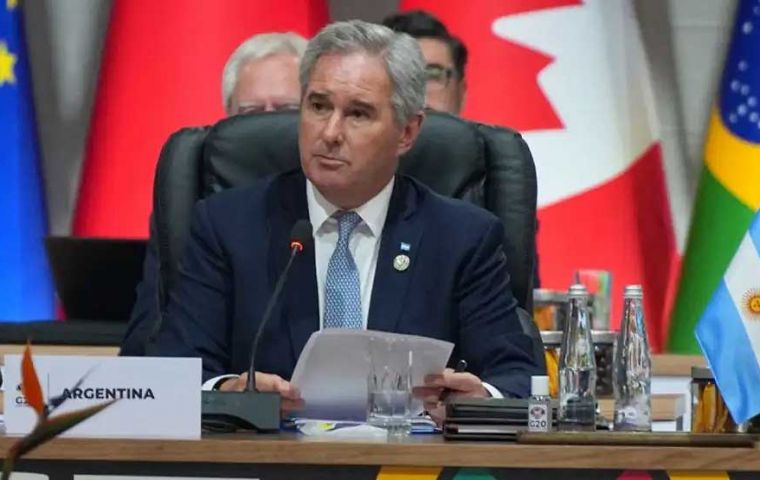MercoPress. South Atlantic News Agency
G20: Argentina does not endorse final document
 Quirno's office said it was essential for the South American country “to preserve the rule of consensus as the basis for the legitimacy of the G20”
Quirno's office said it was essential for the South American country “to preserve the rule of consensus as the basis for the legitimacy of the G20” Argentina declined to endorse the final document circulated during the G20 Leaders' Summit, which concluded on Sunday in Johannesburg (South Africa), citing a breakdown of governing consensus rules and “substantive differences in the geopolitical considerations.”
Foreign Minister Pablo Quirno confirmed the decision in an official statement, expressing regret that the declaration was approved “without the consensus of all members of the forum, including Argentina, among others.”
Quirno's office said it was essential for the South American country “to preserve the rule of consensus as the basis for the legitimacy of the G20.” Argentina strongly differed with the document's approach to the conflict in the Middle East, which it considered “biased” after the text omitted the “regional context and the underlying structural causes of the conflict,” which Argentina deems indispensable for advancing a “genuine, sustainable, and balanced” peace process.
Argentina’s decision came amid a summit already marked by deep geopolitical divisions and an unprecedented boycott by US President Donald Trump, an ally of Milei.
Despite the tensions, the G20 —which represents 85% of global GDP— issued a joint statement declaring that they were meeting “in a context of increasing geopolitical and geoeconomic competition and instability, intensifying conflicts and wars, deepening inequality, increasing global economic uncertainty and fragmentation.”
Washington refused to send a high-level representative, a move the White House denied was a change in participation, though South African Foreign Minister Ronald Lamola stressed the minimum requirement was a head of state or minister. Trump also accused the South African government of persecuting the Afrikaner minority.
Also skipping the event were President Xi Jinping (China), Vladimir Putin (Russia), and Claudia Sheinbaum (Mexico).
In this scenario, Canadian Prime Minister Mark Carney acknowledged that “we are not living through a transition, but a rupture.”
“In every rupture lies the responsibility to build; nostalgia is not a strategy,” he added. “Too many countries are retreating into geopolitical blocs or battlegrounds of protectionism.”
“The G20 could be coming to the end of a cycle,” French President Emmanuel Macron feared.
South African President Cyril Ramaphosa and others championed the summit’s focus on the priorities of the Global South, including tackling inequality and supporting debt sustainability.
The summit concluded with the G20 defending multilateralism in the face of a fragmented world order, even as the lack of full consensus underscored the bloc's struggle to find common ground on sensitive geopolitical issues.
The G20 brings together 19 countries, plus the European Union and the African Union. The United States is set to take over from South Africa as chair of the G20. The Trump administration has already said it wants to limit next year's summit in Miami to issues of economic cooperation.




Top Comments
Disclaimer & comment rulesCommenting for this story is now closed.
If you have a Facebook account, become a fan and comment on our Facebook Page!